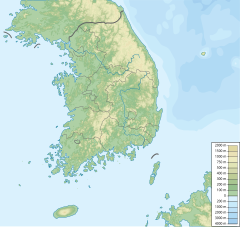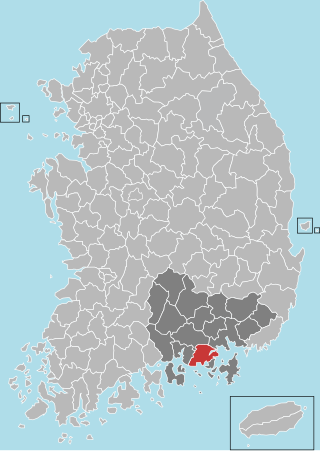
Goseong County (Goseong-gun) is a county in South Gyeongsang Province, South Korea
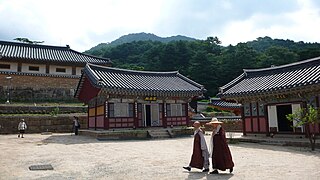
Hapcheon County (Hapcheon-gun) is a county in South Gyeongsang Province, South Korea.

The Nakdong River or Nakdonggang is the longest river in South Korea, which passes through the major cities of Daegu and Busan. It takes its name from its role as the eastern border of the Gaya confederacy during Korea's Three Kingdoms Era.
Namak-ri is a small town in Samhyang-myeon, which is part of Muan County in South Jeolla province of South Korea. Namak-ri became the home of the South Jeolla provincial government following its move from the city of Gwangju in 2005.
Epaksa is a South Korean Techno-trot singer. his birth name is Lee Yong-Seok. "Techno-trot" is a fusion genre of music which was popular in 1990s and early 2000s, and was well known as speedy tempo.

Paljoryeong is a mountain pass in southeastern South Korea, lying between the peaks of Bonghwasan and Sangwonsan, which are both slightly over 660 meters high. The pass itself is slightly less than 400 metres (1,300 ft) above sea level. It lies on the border of modern-day Daegu metropolitan city and Cheongdo, Gyeongsangbuk-do province. At one time it was the major overland route between Daegu and the region to its south. The north side of the pass is in Daegu, in Gachang-myeon, Dalseong-gun. The south side is in Cheongdo's Iseo-myeon.

GwangjuSongjeong Station is a station in Gwangju, South Korea. It is on the national high-speed KTX railway network, 341 km south of Yongsan Station.
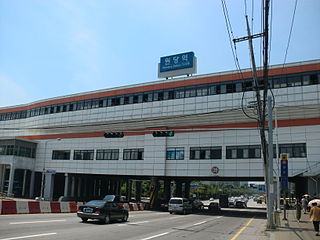
Wondang Station is on Seoul Subway Line 3 in Goyang, Gyeonggi Province. Goyang City Hall is nearby. There is a lot of building work in the area undertaken by SK, Daewoo and other companies; including many apartment complexes, shopping malls and a multiplex cinema.
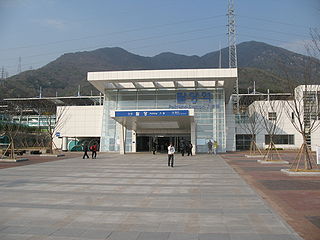
Paldang Station is a station on the Gyeongui–Jungang Line, located in the city of Namyangju by the northern banks of the Han River. Although it is one of the older train stations in Korea, the area around the station is not developed to a great degree.

Joongdong High School is a private school founded in 1906, located in Irwon-dong, Gangnam District, Seoul, South Korea. The school and its foundation were undertaken in 1994 by Samsung Group by the will of group's founder, Lee Byung-chul, the school's 26th graduate. This school is currently operated by Joongdong Educational Foundation.
Shinil High School is a secondary school in Seoul, South Korea. It was founded in 1966, and has been designated as an autonomous private school by the Ministry of Education since 2009.

Young Poong Books is a major South Korean book store chain headquartered in Gangnam-Gu, Seoul, South Korea. Along with Kyobo Book Centre and Bandi & Luni's, YP Books constitutes one of the three largest book store companies in South Korea. YP Books is a subsidiary of the Young Poong Group.
Jeju International University is Tamra University and Jeju University of Industry and Information are integrated and open to private universities, located in Jeju, South Korea. In 1972, it was admitted to Jeju Unemployment College. In 1982, it changed its name from Jeju Unemployment College to Jeju Special Forces College. In 1998, Jeju Junior College changed its name to Jeju Industrial Information College. In 1999, Jeju Industrial Information University was established and the Lifelong Education Center was approved the same year. Shim Kyu-ho took office and was established as Jeju International University on March 1, 2012. Ahn Sang-bo graduated Automotive Engineering.
Shin Seok-cho (1909–1975) was a Korean poet and journalist. He was born in Seocheon, Chungcheongnam-do, in 1909. Involved with socialism, he joined Korean Artist Proletarian Federation (KAPF) but subsequently withdrew. In 1935, he met Yi Yuk-sa and became a close acquaintance.
Honorary Poets are called 'Myung-ye Si-in' in Korea and are the honorary members of the Society of Korean Poets. Originally, the members of the Society of Korean Poets are subject to poets. However, if a person approves and respects the purpose of the association and contributes greatly to the advancement of Korean poet literature, he serves as an honorary member of the Society of Korean Poets. An Honorary Poets shall decide through the Board of Directors under the Society's Articles of Association.
Kim Sung-woo is honorary poet and journalist of South Korea.
Kim Yeonkyung is a Korean writer, Russian literature scholar, and translator. As a translator, she has been mostly translating Dostoevsky's works into Korean. She also teaches Russian literature in university.
Your Republic is Calling You is a Korean novel written by Kim Young-ha. Borrowing the title of René Magritte’s series of paintings, Empire of Light, Bichui jeguk is about a North Korean spy stationed in South Korea and the day he is summoned back to North Korea. The novel both overviews the societal changes that Korea went through from the 1980s to the 2000s and follows the fate of a man whose fate becomes wholly unknown to him. In 2016, Bichui jeguk was jointly adapted into a play by the National Theater of Korea and the Centre Dramatique National Orléans and performed in both South Korea and France.
Sŏ Ir-ok is a Korean sijo poet. Since her debut as a poet in 1990, she has written realist sijo poems with gritty descriptions of Korean society, based on her interest in the marginalized.
Choe Dooseok is a Korean poet. Since his debut in 1980, he has continued to write poems that combine facticity with lyricism. His poems are considered compassionate toward objects, and at the same time, equipped with keen insight into reality. He argued for narrative poetics from a realist perspective.

